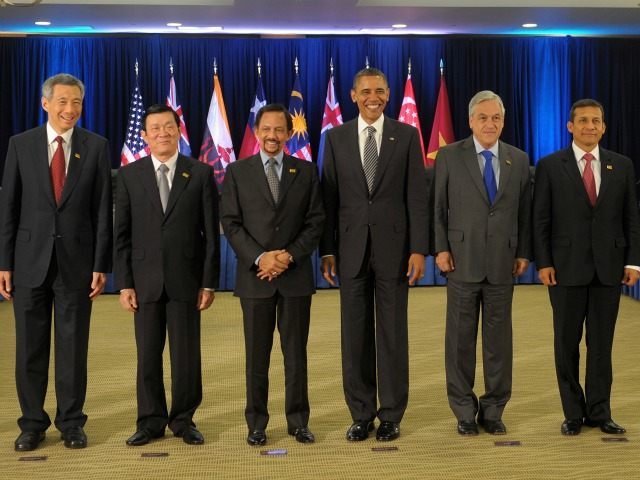The new Trans-Pacific Partnership trade-deal allows U.S. and foreign companies to hire foreign professionals and technicians to take skilled jobs in the United States, while still only paying them wages typical for their home countries, such as Vietnam and Malaysia, immigration expert Rosemary Jenks told Sirius XM’s Breitbart News Daily radio show.
“We have this massive [TPP] contract that we are apparently about to sign — if they have their way in Washington — that says we are going to open our entire service industry to companies and [their] employees from all of these partner countries,” said Jenks, the director of government relations at NumbersUSA
NumbersUSA is an immigration-reform group that wants to reduce the annual inflow of roughly 1 million immigrants and 700,000 guest-workers. Currently, roughly 4.4 million Americans turn 18 each year.
House Speaker Paul Ryan, plus Michael Froman, the chief U.S. trade negotiator, and many other officials, have deceptively claimed that the TPP trade deal makes no changes to the nation’s immigration laws, Jenks said. “It is the sleight-of-hand that is so typical of Washington,” she said.
“It is technically true… [that] TPP would not require us, up front, to change our immigration laws,” she said, if it is approved by the House and Senate next year. But it would create an huge new market for service companies to use existing laws to hire foreign service professionals for jobs in the United States, and it creates a new international committee that can make immigration changes, she said.
TPP’s forced rewrite of the nation’s immigration laws “comes at the back end of the [TPP] process, not the front end,” Jenks said.
The TPP’s opening-up of the U.S. service sector is critical, she said. It means companies will have an incentive to maximize their use of existing rules that allow them to bring an unlimited number of foreign workers — dubbed ‘guest workers’ — into the United States.
The guest-worker visas are L-1 visas and the B-1 business-tourist visas, she said. Service jobs include law, medical and engineering, architecture, equipment and machine maintenance, telecommunications and much else, she told Breitbart News in a later interview.
For example, “if GE can make the argument that a particular [foreign] mechanic serving a particular kind of machine has specialized knowledge, then the person can brought over from Malaysia,” via the L-1 visa, to work in a job in the United States at normal Malaysian wage-rates, she said.
Even if the migrant foreign workers are paid American wage-levels, she said, the huge influx of foreign workers will flood the U.S. market and drive down wages paid to American technicians and professionals. “It is pure supply-and-demand,” she said. For example, “if you increase the supply of legal services, you increase the number of law firms, you reduce the wages of [American] lawyers,” she said.
Top government officials are trying to hide this hugely important part of the TPP deal, she said.
The sheer size and complexity of the TPP deal hides the foreign-labor impact, she told Breitbart News. “There is a chapter in the TPP called ‘Temporary Entry for Business Persons.’ That would be the immigration chapter, right? [But] the United States didn’t take part in a specific subchapter of that part so [it appears] we are not changing our immigration laws up front for TPP,” she said.
Also, the TPP deal does not obviously mandate the inflow of foreign workers, but it creates huge incentives for U.S. companies to hire foreign workers, at foreign-wage rates, she said. The TPP’s chapter on cross-border trade in services “guarantees that the United States will open our economy to the TPP partners countries to send in service-providers… across the service industry,” she said.
Similarly, the treaty does not formally change U.S immigration laws, but it creates an international commission that can and will later change those laws to the advantage of companies and foreign countries, she told Breitbart. Once the treaty is signed, the TPP “the commission is the arbiter” of U.S immigration law, she said.
“It can decide the U.S. is not doing enough to open up its visa process or is not allowing enough service-providers to come… and that puts pressure on Congress to change our immigration laws.”

COMMENTS
Please let us know if you're having issues with commenting.